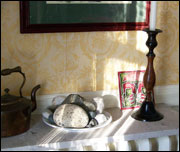My friend Gregg has a shrine in the hallway
Where did I get this idea that the people in my shrine should be perfect?
One of the sources of our Unitarian Universalist faith is the prophetic words and deeds of great men and women. In believing that there is ongoing revelation about the truth of things, one lets go of thinking that all truth has been laid out for us, that a sacred book could have answers to everything. Truth is revealed through actions and words, not only of ancient people but of people who have made history in our own lifetimes. We also learn from the words and deeds of the people down the street in our neighborhood, sitting next to us on the subway, dancing to the swing band while we play the fiddle.
I have been thinking for years about whose pictures might make up my shrine, if I were to build one. I might have pictures of Ralph Waldo Emerson, Robin Hood, Margaret Sanger, Bette Midler. I wasn’t raised to have heroes, in the sense of believing someone was without flaws. My father taught me that the line between creation and destruction runs down the middle of every person. He adored JFK, and maybe he thought of him as a hero, but he was well aware of at least a few of the man’s weaknesses. This sense that everyone is flawed has kept me from building a shrine like my friend’s.
It’s getting harder and harder to admire people with your whole heart. We come to realize unsavory things about Thomas Jefferson or Jimmy Carter. Someone says Bette Midler wasn’t kind to the little people on her way to the top. Bear Bryant certainly wasn’t a perfect hero. Apparently Gandhi had a difficult relationship with his children. Should we allow ourselves to enshrine people who do a variety of deeds, some enlightened and some egregious? Perhaps we could keep our sense of purity if we allow as much of their picture in our shrine as represents the percentage of them that is admirable, so we would have torn up confetti photographs in a montage.
I would hate to think how I might have to rip off chunks of my photograph if I wanted to be up there amongst my heroes. If I demand perfection of them, surely I must demand it of myself, right?
So I’m stuck. I want to draw from words and deeds of great men and women, but how do you tell who is great and who isn’t? What if I love some of the things Emerson said and did and I don’t love others? What if one of my friends is brave and kind, adventuresome, healthy and skilled, but clumsy at relationships and bad with money? I still admire my friend.
The ancient Greek heroes all had flaws, and their gods had flaws. The characters moving through the Hebrew Scriptures had flaws, yet they are held up to us as models of faithfulness and bravery. Where did I get this idea that the people in my shrine should be perfect? Where did I get the idea that perfection had anything to do with greatness? The revelation of truth, in my life, has come from things people have written and said, from a painting by Mark Rothko, and from music by Josquin des Prez.
I just got a swift and lovely “beyond categorical thinking” lesson from a burly Alaskan man in his seventies. His hair was white and somewhat uncombed, his boots were scuffed and his khakis wrinkled. He was getting a pedicure in the Fairbanks nail salon where we were doing the same. That took me aback a little, but it was when I saw him hand the lady a bottle of autumn bronze polish that I had to admit I had looked at him and judged him as a certain type of man. He showed me handily that I had no idea what type of man he was, and for that I thank him. His picture would be in my shrine for a while, at least.
Suddenly it has occurred to me that those I enshrine don’t have to be the same people year in and year out. Guides need to change as the path changes. I might need a model of insane courage at one point in my life, while at another point I may not be taking the same risks I would were I responsible only for myself. At that point I may want a model of care and gentle thoroughness.
I can relax. Perfection and greatness, I think, are unrelated. I can now respond with equanimity to the people who love to burst my bubble about people I admire by telling me Gandhi’s children hated him, or that Bette Midler was rude to them, or that Robin Hood is fictional. I’ll just mutter “Your mom’s fictional” under my breath and light my candles in peace.
Comments powered by Disqus








